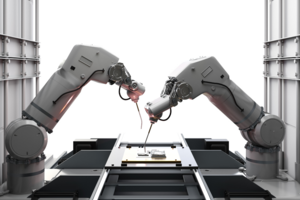Want to transform your HR function? This is how you can get it right

Alex Burr, Partner at Odgers Interim Australia, and Katie Hooker, Head of Candidate Care at Odgers Interim Australia explain how organisations can carry out a successful HR transformation
When it comes to transformation, HR doesn’t always make it to the top of the agenda. Customer-focused functions such as sales, product development or more general technology-led change are likely to take precedence – if only because CEOs and Boards can see more quantifiable returns on investment. HR transformation is however, no less important.
Organisations are challenging traditional concepts of workforce methodology, redefining organisational culture and placing greater importance on the employee experience. Why? Because when such initiatives are done right, they can become a silver bullet for recruiting and retaining talent, dramatically improve productivity and ultimately reap rewards that benefit the organisation’s bottom line. HR plays a crucial role in this kind of organisational change; transforming an organisation’s HR capabilities is therefore becoming of increasing importance to leaders – not only in Australia but around the world.
Like any transformation, getting it right can be tricky so I wanted to share my own experiences of working with organisations, as well as the experiences of two of our interim HR executives – both of whom have expertise in developing and driving people, culture and corporate transformation strategies. These are our five key recommendations for organisations looking to carry out an HR transformation.
1. Secure senior leadership buy-in
“The biggest challenge is in ensuring a business case is supported by the CEO and other senior executive members,” says Liz Malady, a strategic HR leader and former people & culture director at CPA Australia; “it should be an organisational priority demonstrated through the business case and with all the leaders invested in the outcomes.”
It is critical, Liz argues, that HR transformation is directly aligned to the core priorities in an organisation’s strategy. This might be to improve the culture and employee experience, or to attract and retain new talent pools. Judith Pettitt, a people and change management expert with extensive Board and c-suite-level experience agrees; “there needs to be a really strong ability to answer the WHY do we need to change. It is critical to ensure that the CEO and the top team are ready to lead and support the moves alongside the HR leader.”
2. Engage key stakeholders
HR transformation – more than any other functional transformation – will have an impact on the wider organisation. It is, almost by definition, the very purpose of the transformation – and is therefore critical that senior stakeholders within other functions have bought into the change programme.
“Ideally the COO, CFO and the CIO will be key supporters of moves to transform HR because transforming HR is part of a system to support organisations to stay at the top of their game,” says Judith. “The most common mistake in HR transformation and any significant organisational change is not engaging stakeholders effectively,” explains Liz.
3. Bring the HR team on the journey
HR transformation should be something done with the HR function, not to it. The HR team will
provide change leaders with a highly accurate picture of what is required for the change journey as well as acting as the primary facilitators of the change itself. “A successful HR transformation is dependent on some genuine consultation so that the HR team will all get the same message of what’s needed and have an opportunity to contribute to how and why the transformation will be undertaken,” says Judith; “totally imposed transformation rarely works as too much time is spent opposing the change.”
What’s more, according to Judith, one of the most common mistakes made when organisations try to implement HR transformation is, “trashing current HR services rather than transitioning to new ways of working.” The HR team need to be engaged from the beginning; they need to understand the necessity for change and their role in implementing it.
4. Take a balanced approach to technology
The HR technology market is experiencing exponential growth. According to business consulting firm Grand View Research, the global industry is expected to grow by 11% between 2019 and 2025, to USD 30.01 billion. It is a hugely exciting space, with innovations presenting HR teams with a plethora of opportunities. However, thinking that if technology changes then everything else will follow is an all too common mistake in the transformation process. Technology should support and be a result of the transformation strategy, not the driving force behind it.
In particular Liz explains, HR technology can be, “significant in improving the employee experience and enabling the HR function. Cloud-based systems such as Workday or SAP Success Factors are key players in this space.” She advises that organisations look out for tools that can, “integrate various systems to support collaboration and communication, as well as add-ons to the HRMS that support talent acquisition and enhance learning portals.”
“Technology can make a significant contribution to the transformation of HR by taking the operational drudgery out of the equation,” explains Judith, “as long as the team realise that it frees them to do relevant business and people development.”
5. Use external support effectively
Bring in external support from the start. Consultation from an experienced HR leader can provide an objective perspective that will identify strategic opportunities, as well as hurdles that the senior leadership team may have overlooked.
Interim executives and independent consultants can often find themselves in the unenviable position of advising organisations to ‘change course’ after being brought in to help with a newly launched or ongoing transformation programme that is not going in a direction that solves the right problems for the organisation.
Engaging an interim or consultant at a strategic level to analyse the scope of transformation whilst it is still a concept will mitigate any potential ‘rerouting’ or backtracking – something that is both costly and can result in ‘change fatigue’. Even if the external support is only sought for strategic analysis and leaves the following stages of implementation to change agents within the organisations, it can result in invaluable insights that will drive a more efficient transformation programme and reduce the risk of coming up against unforeseen challenges.
For more information please contact Alex Burr and Katie Hooker.






Comments
Liz Schenke at 05/12/2019 02:25 said:
Deb Maddigan at 11/03/2020 04:29 said:
Add your comment